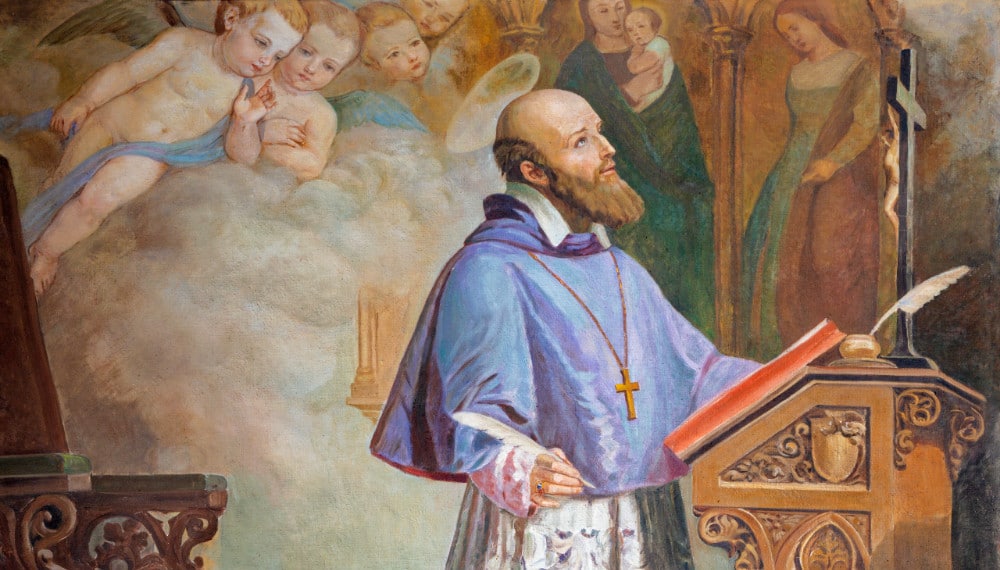St. Francis de Sales had you in his sights centuries ago.
And his aim holds true, even as we marked the 400th anniversary of his death on Dec. 28, 2022.
Yes, a bishop, founder, saint and Doctor of the Church, but … man, he was a good writer, too! The patron saint of the Catholic press. Solid theology, practical advice and a way with words that captures those of us who stumble over Augustine of Hippo, Thomas Aquinas, Teresa of Ávila, John of the Cross and such.
In his “Introduction to the Devout Life,” he offers uncomplicated, doable, easy-to-remember and easy-to-apply ways we can develop and live a devout life in the early 21st century.
Prove it, you say? (You challenge.)
Let’s start with the book’s preface where he — humbly and accurately — points out he’s not telling you anything new:
“Assuredly I neither desire, nor ought to write in this book anything but what has been already said by others before me.
“I offer you the same flowers, dear reader, but the bouquet will be somewhat different from theirs, because it is differently made up.”
But! He adds:
“Almost all those who have written concerning the devout life have had chiefly in view persons who have altogether quitted the world; or at any rate they have taught a manner of devotion which would lead to such total retirement.
“But my object is to teach those who are living in towns, at court, in their own households, and whose calling obliges them to a social life, so far as externals are concerned. Such persons are apt to reject all attempt to lead a devout life under the plea of impossibility. …
“And thus it is that, while conscious of my own weakness, I endeavor by this book to afford some help to those who are undertaking this noble work with a generous heart.”
That could be … us, if we take a look at this how-to/why-to. At this series of “emails, texts and tweets,” that come from long ago to here and now. From St. Francis to you.
Two things: First, a short bio. And second, an “Introduction to the Devote Life” sampler.
Wait! Three things, although you can be certain the saint never saw this coming. Third, you can find free downloadable PDF and audio versions of the book here.
All right, on to the bio:
He was born into a noble family in Savoy, France, in 1567 and received his doctorate in law at age 24. He left that career to study for the priesthood despite the grumbling of his family. He was ordained in 1593, named bishop of Geneva in 1602 and became a leading figure in the Counter-Reformation. Noted for his wisdom and learning, and for being an outstanding confessor, St. Francis also founded schools and, with St. Jane Frances de Chantal, the Order of the Visitation in 1610.
Also! He wrote “Introduction to the Devout Life” in 1609, which began as a small manual for his cousin’s wife. (Family, eh?)
And now: Your introduction to “Introduction to the Devout Life.”
From Chapter 1: What true devotion is:
“You aim at a devout life, dear child, because as a Christian you know that such devotion is most acceptable to God’s Divine Majesty. …
“Devotion is simply a spiritual activity and liveliness by means of which Divine Love works in us, and causes us to work briskly and lovingly; and just as charity leads us to a general practice of all God’s Commandments, so devotion leads us to practice them readily and diligently.”
From Chapter 2: The nature and excellence of devotion:
“Devotion is the real spiritual sweetness which … cures the poor of sadness, and the rich of presumption; it keeps the oppressed from feeling desolate, and the prosperous from insolence; it averts sadness from the lonely, and dissipation from social life; it is as warmth in winter and refreshing dew in summer; it knows how to abound and how to suffer want; how to profit alike by honor and contempt; it accepts gladness and sadness with an even mind, and fills men’s hearts with a wondrous sweetness. …”
“Believe me, dear child, devotion is the sweetest of sweets, the queen of virtues, the perfection of love. If love is the milk of life, devotion is the cream thereof; if it is a fruitful plant, devotion is the blossom; if it is a precious stone, devotion is its brightness; if it is a precious balm, devotion is its perfume, even that sweet odor which delights men and causes the angels to rejoice.”
From Chapter 3: Devotion is suitable to every vocation and profession:
“When God created the world he commanded each tree to bear fruit after its kind; and even so he bids Christians — the living trees of his Church — to bring forth fruits of devotion, each one according to his kind and vocation.
“A different exercise of devotion is required of each — the noble, the artisan, the servant, the prince, the maiden and the wife; and furthermore such practice must be modified according to the strength, the calling, and the duties of each individual. …”
“Indeed, my child, the devotion which is true hinders nothing, but on the contrary it perfects everything; and that which runs counter to the rightful vocation of anyone is, you may be sure, a spurious devotion.”
“It is an error, nay more, a very heresy, to seek to banish the devout life from the soldier’s guardroom, the mechanic’s workshop, the prince’s court, or the domestic hearth.”
And these are from just the first three chapters of the of the book … Part 1! There are many chapters in each of its five parts.
But let’s skip to the end:
“Finally, my beloved child, I say to you: Look to heaven, and do not lose it for earth; look at hell, and do not plunge therein for the sake of this passing life; look at Jesus Christ, and do not deny him for the world’s sake. … [And] if the devout life sometimes seems hard and dull, join in St. Francis of Assisi’s song:
‘So vast the joys that I await, / No earthly travail seemeth great.'”
Bullseye!
Bill Dodds writes from Washington.
| Tasty ‘Devout Life’ tidbits |
|---|
|







